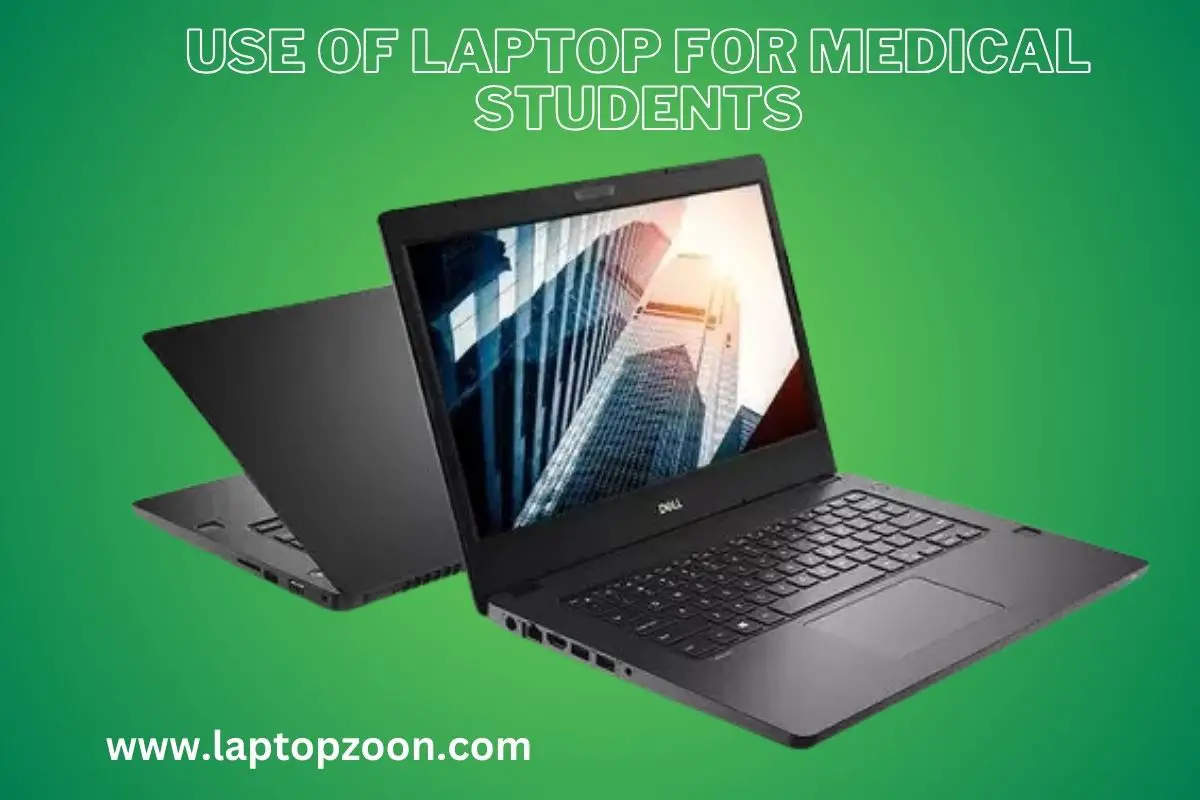Use of Laptop For Medical Students 2024
Wellcome to the use of laptop for medical students ,Technology has revolutionized the way we learn and practice medicine, and laptops have become an indispensable tool for medical students. In this digital age, where information is just a click away, leveraging the power of laptops can give aspiring healthcare professionals a competitive edge.
From accessing online resources to organizing study materials efficiently, laptops offer numerous advantages that enhance the educational journey of medical students. However, it’s essential to strike a healthy balance in laptop usage to avoid potential disadvantages. In this blog post, we will explore both sides of the coin and provide valuable tips on how medical students can make the most out of their laptops while maintaining a well-rounded approach to their studies. So grab your stethoscope (and your laptop), as we dive into the world of technology-assisted learning for medical students!
Advantages of Laptops in Medical Education:
1. Access to Online Resources: Laptops open up a world of information and resources for medical students. With just a few clicks, students can access online textbooks, journals, lectures, and other educational material that can supplement their learning. This not only saves time and money but also provides a more comprehensive understanding of the subject matter.
2. Organization and Note-Taking: Laptops make it easy for medical students to keep their notes organized and easily accessible. With features like folders, bookmarks, and search options, students can quickly find the information they need for their studies. Additionally, laptops allow for efficient note-taking during lectures, with the ability to type or even use recording software to capture important points.
3. Interactive Learning: Laptops can be used for interactive learning activities such as quizzes, simulations, and virtual patient scenarios. These tools help in developing critical thinking skills and enhancing problem-solving abilities in medical students.
4. Communication and Collaboration: Laptops enable medical students to collaborate with their peers and professors through online platforms such as discussion forums or video conferencing. This promotes teamwork and allows for discussions beyond the classroom setting.
5. Portability: Unlike desktop computers, laptops are lightweight and portable, making
Advantages of using laptops for medical students
Advantages of Using Laptops for Medical Students
In today’s digital age, technology plays a crucial role in every aspect of our lives, and medical education is no exception. The use of laptops has become increasingly prevalent among medical students, offering numerous advantages that enhance their learning experience.
One significant advantage is the easy access to online resources and textbooks. Gone are the days when students had to carry around heavy textbooks. With a laptop, medical students can conveniently access e-books, research articles, and online databases at their fingertips. This enables them to stay updated with the latest advancements in medicine and have a vast array of information right at their disposal.
Another advantage is the ability to organize notes and study materials effectively. With applications like Evernote or OneNote, students can create digital notebooks where they can store lecture slides, class notes, and additional study materials all in one place. This not only helps in staying organized but also allows for quick retrieval of information during exam preparation.
Efficient time management is yet another benefit offered by laptops. Medical school demands rigorous schedules with multiple assignments and exams on various subjects simultaneously. Laptops enable students to efficiently manage their time by using productivity apps such as Todoist or Google Calendar to set reminders, prioritize tasks, and track progress.
Furthermore, laptops provide medical students with opportunities for utilizing simulation programs and online learning platforms. These tools allow them to practice clinical skills virtually before encountering real-life patients or participate in interactive case discussions through virtual patient simulations. Such experiences bridge the gap between theory-based knowledge and practical application while fostering critical thinking skills.
While there are several advantages associated with laptop usage for medical students; it’s essential to strike a healthy balance between screen time and other activities – both academically related (such as hands-on training) as well as personal aspects (like physical exercise or social interactions). Taking regular breaks from screens can help reduce eye strain while promoting overall mental well-being.
In conclusion,
laptops have revolutionized the way medical students learn and prepare for their future careers
Access to online resources and textbooks
Access to online resources and textbooks
The world of medicine is constantly evolving, with new research and discoveries being made every day. As a medical student, staying up-to-date with the latest information is crucial for success. Thankfully, laptops provide easy access to a wealth of online resources and textbooks that can enhance your learning experience.
With just a few clicks, you can dive into the vast sea of medical knowledge available on the internet. Online databases such as PubMed offer an extensive collection of scientific articles and journals that cover various medical specialties. These resources allow you to explore different perspectives, gain deeper insights into complex topics, and broaden your understanding of diseases and treatments.
Furthermore, many renowned medical textbooks are now available in digital formats. This means that instead of carrying around heavy books everywhere you go, you can simply access them on your laptop at any time. Whether it’s anatomy atlases or pharmacology references, having these valuable resources readily available enhances convenience while studying.
In addition to traditional textbooks, there are also interactive e-books specifically designed for medical students. These e-books often come with features like practice questions, videos demonstrating clinical procedures, and interactive quizzes – making learning more engaging and effective.
Moreover, online platforms such as Khan Academy or Coursera provide access to educational videos covering various topics in medicine. From lectures on cardiology to tutorials on radiology imaging techniques – these videos serve as excellent supplementary materials for better understanding complex concepts.
By utilizing laptops for accessing online resources and textbooks effectively during your study sessions or even during quick breaks between classes or rotations – you maximize your potential by harnessing the power of technology in advancing your medical education. So make sure to take full advantage!
Remember: Accessing reliable sources is vital when using online materials for studying purposes! Always verify the credibility of websites before trusting their content blindly!
Organizing notes and study materials – Use of Laptop For Medical Students
One of the biggest challenges for medical students is keeping track of vast amounts of information and study materials. Thankfully, laptops offer an excellent solution to this problem by providing a convenient platform for organizing notes and study materials.
With a laptop, medical students can create digital folders to categorize their notes based on subjects or topics. This makes it easier to locate specific information when studying or revising for exams. Additionally, using software like Microsoft OneNote or Evernote allows students to type or write directly on the screen, making note-taking more efficient and organized.
Furthermore, laptops enable students to access various productivity tools that aid in organizing their study materials. These tools include digital planners and task management applications like Trello or Todoist, which help prioritize tasks and set deadlines.
Another advantage is the ability to search through electronic textbooks quickly. Instead of flipping through hundreds of pages searching for a particular topic, medical students can simply use the search function on their laptops to find relevant information within seconds.
Additionally, many online platforms offer cloud storage options where you can securely store your notes and study materials. This ensures that even if you lose your physical notebook or flash drive containing important files, you still have access to all your notes from any device with internet connectivity.
In conclusion,laptops provide medical students with invaluable organizational tools that streamline their studies by keeping everything in one place digitally accessible from anywhere at any time
Efficient time management
Efficient Time Management:
As a medical student, time management is crucial in order to juggle the demands of studying, attending lectures, and participating in clinical rotations. Thankfully, laptops can be valuable tools for optimizing your time and productivity.
One way laptops aid in efficient time management is through their ability to streamline tasks. With a laptop, you can easily access online resources and textbooks without having to spend hours searching through physical books or visiting libraries. This allows you to quickly find the information you need and move on to other important tasks.
Furthermore, laptops are great for organizing notes and study materials. Instead of relying on handwritten notes that can be disorganized or lost, digital note-taking apps allow you to categorize and search your notes with ease. This saves precious time when reviewing for exams or preparing presentations.
In addition, utilizing simulation programs and online learning platforms on your laptop enables you to practice medical procedures virtually whenever it suits your schedule. This eliminates the need for scheduling specific lab times or finding available equipment—a significant advantage when trying to make the most of limited study hours.
However, it’s important not to become overly reliant on laptops as this may lead to excessive screen time which can negatively impact both physical health (such as eye strain) and mental well-being (such as decreased focus). Therefore, maintaining a healthy balance between laptop use and offline activities is essential.
To achieve this balance:
1) Set designated screen-free breaks throughout the day.
2) Incorporate exercise into your routine.
3) Prioritize face-to-face interactions with peers during study sessions.
4) Use productivity apps that remind you about taking breaks from screens.
By effectively managing your time using laptops while also prioritizing self-care practices offline,you’ll maximize efficiency without sacrificing overall well-being.
Utilizing simulation programs and online learning platforms
Simulation programs and online learning platforms have revolutionized medical education, providing students with invaluable opportunities to enhance their skills and knowledge. These tools allow medical students to engage in realistic scenarios that simulate patient care, diagnostic procedures, and surgical interventions.
By utilizing simulation programs, students can practice their clinical decision-making skills in a safe environment without the risk of harming real patients. They can learn how to manage emergencies effectively, develop critical thinking abilities, and improve their teamwork and communication skills. These programs also provide instant feedback on performance, allowing students to identify areas for improvement.
Online learning platforms offer a wealth of educational resources such as interactive lectures, virtual anatomy models, case studies, and quizzes. Medical students can access these materials anytime and anywhere using their laptops. This flexibility enables them to study at their own pace and reinforce concepts learned in class.
Furthermore, online platforms facilitate collaboration among peers through discussion forums or virtual study groups. Students can share insights and discuss complex medical topics with others from different institutions or even across borders. This exchange of ideas fosters a sense of community amongst aspiring healthcare professionals.
In conclusion,
simulation programs
and online learning platforms are powerful tools that complement traditional classroom-based learning for medical students.
They provide an immersive experience where theory is put into practice,
allowing future doctors to develop essential clinical skills,
gain exposure to various specialties,
and stay up-to-date with the latest advancements in medicine.
The use of laptops has made these resources easily accessible,
enhancing the educational journey of aspiring healthcare professionals worldwide.
However,it’s important for students to maintain a healthy balance between laptop usage
and other aspects of life,to ensure overall well-being throughout their medical education journey
Disadvantages of excessive laptop use for medical students
Excessive laptop use can have its downsides for medical students. While technology has undoubtedly revolutionized the way we learn and access information, it’s important to be aware of the potential drawbacks.
One major disadvantage is the risk of becoming too dependent on laptops for studying. Relying solely on digital resources can limit critical thinking skills and hinder problem-solving abilities that are crucial in the field of medicine.
Another drawback is the potential for distractions. With social media, emails, and other tempting websites just a click away, it’s easy to get sidetracked from studying. This can lead to decreased productivity and difficulty retaining information.
Extended hours spent hunched over a laptop screen can also take a toll on physical health. Poor posture, eye strain, and repetitive strain injuries are common issues among those who spend excessive time on their laptops.
Furthermore, relying heavily on laptops may limit interaction with peers and instructors during study sessions or lectures. Collaborative learning opportunities can be missed when everyone is engrossed in their screens.
It’s important for medical students to strike a balance between utilizing technology as a tool for learning while also engaging in hands-on experiences and face-to-face interactions with patients and colleagues.
While laptops offer numerous advantages in medical education, there are also disadvantages that should not be overlooked. By being mindful of these drawbacks and finding ways to mitigate them through healthy habits and alternate study methods, medical students can make the most out of their technological resources without sacrificing critical skills or well-being.
Tips for maintaining a healthy balance with laptop usage
Tips for Maintaining a Healthy Balance with Laptop Usage
1. Set Boundaries: It’s essential to establish boundaries and set specific times when you will use your laptop for studying or research purposes. Create a schedule that includes dedicated study periods and breaks to ensure you don’t spend excessive time on your device.
2. Take Regular Breaks: Long hours of staring at a screen can strain your eyes and lead to fatigue. Remember to take short breaks every hour or so, where you step away from the laptop, stretch, and give your eyes some rest.
3. Practice Ergonomics: Pay attention to your posture while using the laptop. Sit in an ergonomic chair and position the screen at eye level to avoid neck and back pain. Invest in an external keyboard or mouse if needed.
4. Prioritize Offline Activities: While laptops offer numerous benefits, it’s important not to neglect offline activities such as exercise, hobbies, socializing, or spending time outdoors. Balancing these activities will help maintain overall well-being.
5. Limit Social Media Use: Social media can be a major distraction during study sessions. Consider installing apps that limit access to certain websites or set designated times for checking social media accounts.
6.
Implement Digital Detox Days: On weekends or days off, consider implementing digital detox days where you disconnect from screens altogether – including laptops, phones, tablets etc., This break will allow you some much-needed downtime without constant technological stimulation.
Remember that maintaining a healthy balance with laptop usage is crucial for both academic success and personal well-being as a medical student!
Conclusion:
The role of laptops in shaping future healthcare professionals
In today’s fast-paced world, technology has become an integral part of our daily lives. This is especially true for medical students who are constantly seeking ways to enhance their learning experience. One such tool that has revolutionized medical education is the laptop. With its numerous advantages and a few potential drawbacks, laptops have become essential companions for aspiring doctors and nurses.
Advantages of using laptops for medical students
Laptops provide easy access to online resources and textbooks. Gone are the days when students had to carry heavy backpacks filled with books. Now, with just a few clicks, medical students can access a vast array of information right at their fingertips. Online databases, journals, and e-books offer up-to-date knowledge that can greatly supplement traditional textbooks.
Organizing notes and study materials becomes effortless with the help of laptops. Medical school requires extensive note-taking during lectures and clinical rotations. Laptops allow students to create organized digital files that can be easily searched and referenced later on. This saves valuable time spent flipping through pages or shuffling papers.
Efficient time management is another advantage offered by laptops in medical education. With busy schedules packed with classes, labs, and extracurricular activities, being able to efficiently manage time is crucial for success as a student doctor or nurse. Laptops come equipped with productivity tools such as calendars, reminders, task managers which help keep track of assignments deadlines.
Furthermore,laptops open doors to utilizing simulation programs and online learning platforms.
Medical simulators provide realistic scenarios where students can practice their skills without any harm coming to actual patients.
Online learning platforms also enable interactive discussions among peers from around the globe.
These virtual environments enhance collaborative learning experiences while fostering critical thinking skills.
Disadvantages of excessive laptop use for medical students
However,the excessive use of laptops may lead to certain disadvantages.
Firstly,prolonged usage could cause physical strain on the body,especially in terms of posture and eye strain.
It is important







